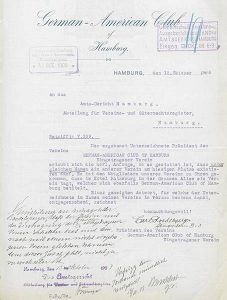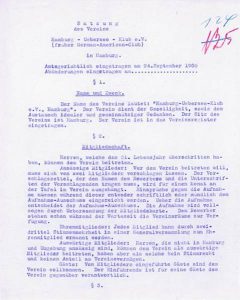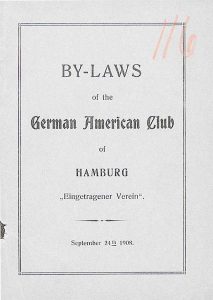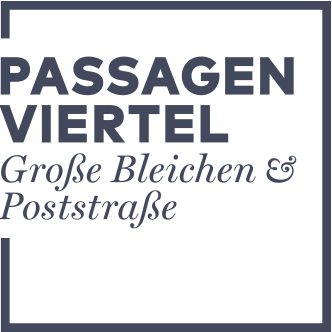1908
1908
Hello America
Around 1900 the Neustadt district was a melting pot of innovations and home to a wide variety of lifestyles. Foreign consulates, import and export firms, government agencies as well as commercial baths operated side by side. The Trocaderohaus, Schümanns Austernkeller and other dance halls appealed to a bourgeois clientele, who, in turn, made the area attractive to exclusive clubs and associations such as the German American Club of Hamburg.
Founded on 1 September 1908 by twelve local merchants sharing a particular affinity to America, the German American Club of Hamburg sought to provide a distinguished environment for fostering and cultivating the use of the English language.
Membership was restricted to well-heeled gentlemen above the age of 18, who were successful businessmen and could afford the high joining fee of 25 reichsmarks and the monthly membership fee of 5 reichsmarks. Applicants who were not of North American extraction had to demonstrate that they had either resided for a certain period in America or that they maintained regular trading relations with North America. The club initially rented rooms at the Börsenhof in downtown Hamburg before moving to Grosse Bleichen 32 in 1909.
Gentlemen members convened socially every first and third Tuesday evening of each month; ladies’ nights took place on the last Saturday of each month.
A house committee was charged with watching over expenses and outgoings but it turned out that at least some of its members were lacking in commercial skills. In 1911 an internal review established that the committee had failed to maintain a proper ledger, leaving certain bills and rents unpaid. To settle the debts which had been run up, the annual payment of the membership fees had to be brought forward.
In 1913 the club was renamed »Hamburg-Uebersee-Klub«. While the minimum age was lifted to 21, new members no longer needed to demonstrate their mastery of the English language and membership was no longer confined to those who had lived in America for a certain period. When these changes failed to attract new members with expenses nevertheless continuing to rise, the club moved to Grosse Bäckerstrasse 12, where attendance at club nights dwindled further. The operations of the club were suspended during the first world war. When a final attempt to win new members among »independent German merchants returning from war service« failed, the remaining members eventually voted to dissolve the club and a notice of liquidation was sent to the official registrar of clubs and associations in June 1919.



